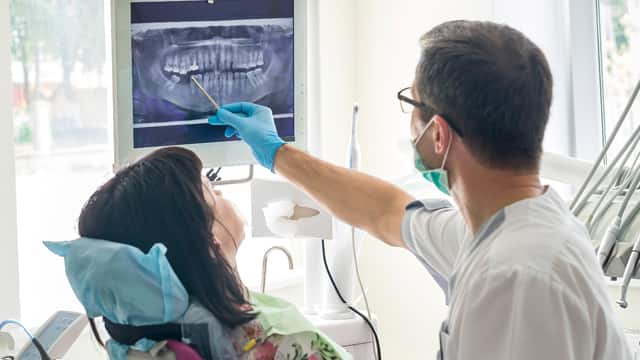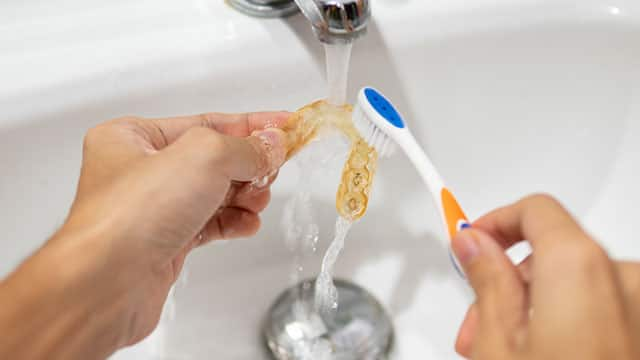What Causes Front Tooth Damage and Loss?
There are a few reasons you may need to repair or replace your front teeth:
Trauma
Often, front teeth are damaged or knocked out due to some type of injury or accident. According to the American Association of Endodontists, more than 5 million teeth are knocked out in children and adults every year.
Gum Disease
Periodontitis, the severe form of gum disease, can cause your gum tissue to recede, bone to wear away, teeth to loosen, and your teeth could even fall out. The Centers for Disease Control and Prevention (CDC) says that 47.2 percent of adults over the age of 30 have some form of gum disease.
Tooth Decay
Severe cases of tooth decay in your front teeth may require extraction if other remedies are insufficient.
Thankfully, gum disease and tooth decay are preventable. Brush at least twice a day, and don't forget to brush your tongue. Consider using helpful products like an antimicrobial mouthrinse and tongue scrapers. And be sure to see your dental professional for regular appointments so they can catch any developing conditions.
If you already have either of these conditions, they're likely to be treatable. Don't wait until your next appointment if you're experiencing symptoms. Visit your dental professional right away.
Learn more about tooth decay and gum disease symptoms.
When Should You Seek Emergency Care?
If you've chipped or damaged your tooth, it may be painful, but it's unlikely your dentist will consider it an emergency. In most cases, you'll be able to make a regular appointment with your dentist in the next day or two to discuss your options and have a chip filled or a broken tooth repaired.
If your front tooth is knocked out completely, you may need emergency care so you can save your tooth. The Cleveland Clinic says that teeth are likely to survive if put back in the socket within 5 minutes. Between 5 and 60 minutes, your chances are still good. After an hour, tooth survival rates drop significantly, so be sure to act promptly.
- Be careful not to hold the tooth by its root. Only hold it by the chewing surface (the crown).
- Contact your dentist immediately for an emergency appointment.
- As you wait for the appointment, rinse the tooth in cool water (no soap) without scrubbing it, then place it back in your child's socket, holding it there with clean gauze or washcloth.
- If it doesn't stay, you can also place the lost tooth in a clean container of cold milk, then head to your dentist's office as soon as possible. If you don't have cold milk, place the tooth in your mouth between your cheek and your gums. Your dentist may be able to graft the tooth back into its socket. Acting fast, you may be able to save the tooth and prevent infection.
Repairing or Replacing Your Front Tooth
If your dentist can't save the tooth, or your tooth is only partially cracked or chipped, you'll need to discuss the following options with your dental professional.
Bonding
If you only have a small crack or chip and the rest of your tooth is in good condition (not requiring a root canal or extraction), your dentist may be able to bond your tooth. If your dental professional recommends this treatment, they will mold a composite material to cover the crack or chip. Then they will cure it to mimic the hardness of your natural tooth enamel. Bonding can last for five to ten years.
Front Tooth Dental Implant
If your dentist decides to extract your tooth or your front tooth has been completely knocked out, they may suggest an implant. Dental implants are metal fixtures surgically fastened to your jawbone below the gums. These metal implants become anchored to your bone through osseointegration (the bone fuses to the metal). This process provides stable support you can rely on while eating and speaking. According to the Cleveland Clinic, the healing process after getting an implant can take 6-12 weeks. Your dental professional will then place a metal post (or abutment) into your implant, onto which they will mount your replacement tooth.
Fixed Bridge
Bridges have two crowns – one on either end – and a bridge of replacement teeth (called pontics) that rest in the area of your gums where there is tooth loss. The crowns at the ends of a bridge can fuse to existing teeth (that need to be filed down by a dental professional to fit correctly). If you have multiple missing teeth, your dental professional can attach them to dental implants.
Partial Removable Dentures
If you have more than one missing tooth and the missing teeth aren't adjacent to one another, a partial denture may be a better option than a bridge. The replacement teeth are attached to fake plastic gums and would rest on top of your gums. Different sections of replacement teeth can be connected by metal wire. The dentures can then be removed for cleaning. They are usually the least expensive option for missing teeth but might not be as durable as other options.
If you've damaged or knocked out a front tooth, call your dental professional right away. They'll either be able to see you for an emergency appointment if necessary, or they will make an appointment for you as soon as is possible if they deem it's not an immediate need. Working together, you'll be able to get your front teeth back to a condition you can smile about.
Oral Care Center articles are reviewed by an oral health medical professional. This information is for educational purposes only. This content is not intended to be a substitute for professional medical advice, diagnosis or treatment. Always seek the advice of your dentist, physician or other qualified healthcare provider.
ORAL HEALTH QUIZ
What's behind your smile?
Take our Oral Health assessment to get the most from your oral care routine
ORAL HEALTH QUIZ
What's behind your smile?
Take our Oral Health assessment to get the most from your oral care routine















